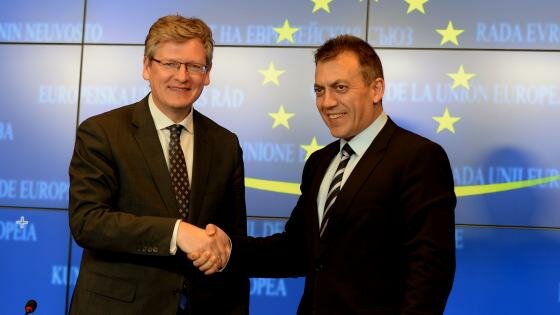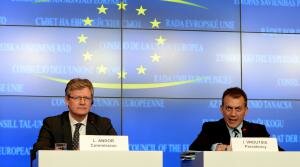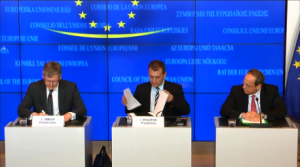- EPSCOEmployment, Social Policy, Health and Consumer Affairs Council (EPSCO)
Last EPSCO (Employment) Council concludes in Luxembourg (19.06.2014)
The last session of the Employment and Social Policy (EPSCO) Council under the Hellenic Presidency, chaired by the Minister of Labour, Social Security and Welfare, Ioannis Vroutsis, took place today (19.06.2014), in Luxembourg, and focused on European Semester related issues and the social dimension of the EU/EMU.
During the morning session, the Council held a policy debate on the European Semester 2014, which constitutes its contribution to the June European Council in the field of employment and social policy. In this framework, Ministers approved the employment and social policy related aspects of the Council Country Specific Recommendations (CSRs) – signalling the successful completion of the 2014 European Semester.
The discussion reflected that further progress has still to be made to ensure that active labour market policies become more efficient, female participation increases, labour mismatches are addressed and labour law supports more and better jobs.
As regards pensions, the discussion has showed that linking the statutory retirement age to life expectancy is only one of the possible options for improving the sustainability of the pension systems. Where relevant, it is important to close the gap between the statutory and effective retirement age.
The Council took note of the progress report on the proposal for a Decision on establishing a European Platform to enhance cooperation in the prevention and deterrence of undeclared work. Minister Vroutsis highlighted that given the remarkable progress that has been achieved during the Hellenic Presidency it would be in the interest of all Member States to reach an agreement as soon as possible under the Italian Presidency.
Over lunch, Ministers discussed "Managing stress and psychosocial risks at work" - one of the main topics of the recently adopted Commission Communication on the "Health and Safety Framework". The debate was enriched by Ms Christa Sedlatschek’s intervention, director of EU Agency for Safety and Health at Work.
During the afternoon session, ministers had the opportunity to exchange views on the social dimension of the EU/EMU on the basis of the Social Protection Committee contributions.
Mr Vroutsis said that the strengthening of the social dimension should be reflected in specific policy initiatives, immediate actions with tangible results to citizens' everyday lives, so that it is not a policy theory, but a concrete policy framework.
The Council also took note of three progress reports: on a proposal for a Regulation regarding the EURES, a proposal for a directive on implementing the principle of equal treatment between persons irrespective of religion or belief, disability, age or sexual orientation and on a proposal for a directive on improving the gender balance among non executive directors of companies listed on stock exchanges.
Moreover, the Council adopted Council conclusions on “Women and the economy: Economic independence from the perspective of part time work and self employment”.
Finally, the incoming Italian Presidency presented its work programme and priorities for the second semester of 2014.
While closing the session, Minister Vroutsis, thanked the European institutions and Member States for their excellent cooperation and their support to the success of the Hellenic Presidency in progressing and finalising important files for the European integration, adding that ‘We succeeded in developing those policies and tools that help us respond to the concerns, needs, and expectations of European citizens. To the needs for decent living conditions, for quality jobs for all and lifetime development opportunities for all of us’.
In addition, Minister Vroutsis said that the European Union could be understood as a chain with rings and the strength of this chain depends on the weakest link. So, solidarity between us in practice means that we should aim at the weakest link so as to make the chain of Europe powerful, unbreakable.










